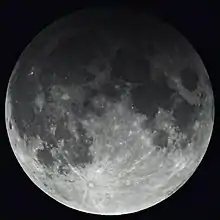| Partial Lunar Eclipse July 27, 2037 | |
|---|---|
 The moon passes west to east (right to left) across the Earth's umbral shadow, shown in hourly intervals. | |
| Series | 139 (23 of 81) |
| Gamma | -0.5582 |
| Magnitude | 0.8095 |
| Duration (hr:mn:sc) | |
| Partial | 3:12:25 |
| Penumbral | 5:40:49 |
| Contacts UTC | |
| P1 | 1:19:29 |
| U1 | 2:33:41 |
| Greatest | 4:09:53 |
| U4 | 5:46:05 |
| P4 | 7:00:17 |
A partial lunar eclipse will take place on July 27, 2037.[1]
Visibility

Related lunar eclipses
Lunar year series
| Ascending node | Descending node | |||||
|---|---|---|---|---|---|---|
| Saros | Date Viewing |
Type Chart |
Saros | Date Viewing |
Type Chart | |
| 114 | 2035 Feb 22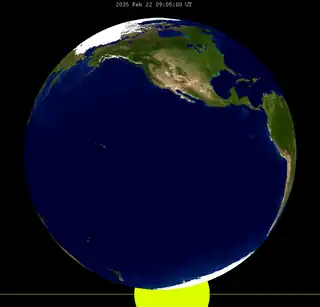 |
Penumbral |
119 | 2035 Aug 19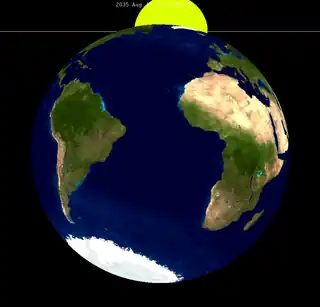 |
Partial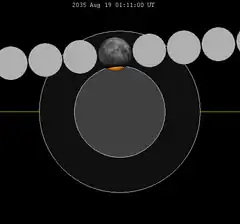 | |
| 124 | 2036 Feb 11 |
Total |
129 | 2036 Aug 07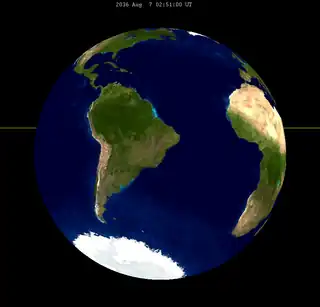 |
Total | |
| 134 | 2037 Jan 31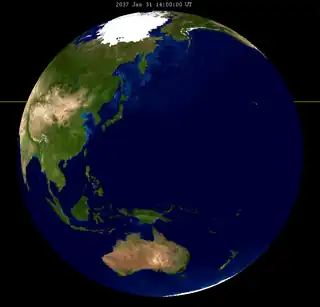 |
Total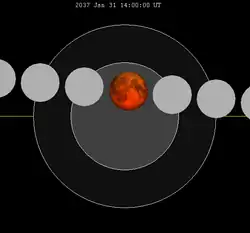 |
139 | 2037 Jul 27 |
Partial | |
| 144 | 2038 Jan 21 |
Penumbral |
149 | 2038 Jul 16 |
Penumbral | |
| Last set | 2034 Apr 03 | Last set | 2034 Sep 28 | |||
| Next set | 2038 Jun 17 | Next set | 2038 Dec 11 | |||
Saros cycle
Lunar Saros series 139, repeating every 18 years and 11 days, has a total of 79 lunar eclipse events including 42 umbral lunar eclipses (15 partial lunar eclipses and 27 total lunar eclipses)..
| Greatest | First | |||
|---|---|---|---|---|
The greatest eclipse of the series will occur on 2199 Nov 02, lasting 102 minutes.[2] |
Penumbral | Partial | Total | Central |
| 1658 Dec 09 | 1947 Jun 03 | 2073 Aug 17 | 2109 Sep 09 | |
| Last | ||||
| Central | Total | Partial | Penumbral | |
| 2488 Apr 26 | 2542 May 30 | 2686 Aug 25 | 3065 Apr 13 | |
| 1911 May 13 | 1929 May 23 | 1947 Jun 03 | |||
 |
 |
 |
 |
 |
 |
| 1965 Jun 14 | 1983 Jun 25 | 2001 Jul 05 | |||
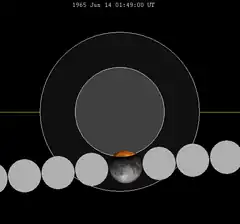 |
 |
 |
 |
 |
 |
| 2019 Jul 16 | 2037 Jul 27 | 2055 Aug 07 | |||
 |
 |
 |
 |
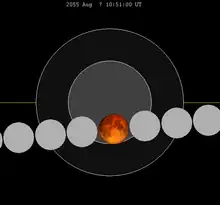 |
 |
| 2073 Aug 17 | 2091 Aug 29 | ||||
Tritos series
- Preceded: Lunar eclipse of August 28, 2026
- Followed: Lunar eclipse of June 26, 2048
Tzolkinex
- Preceded: Lunar eclipse of June 15, 2030
- Followed: Lunar eclipse of September 7, 2044
See also
Notes
External links
- 2037 Jul 27 chart: Eclipse Predictions by Fred Espenak, NASA/GSFC
This article is issued from Wikipedia. The text is licensed under Creative Commons - Attribution - Sharealike. Additional terms may apply for the media files.
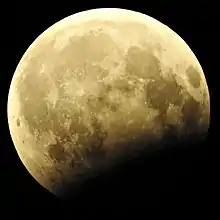
_(cropped).jpg.webp)
